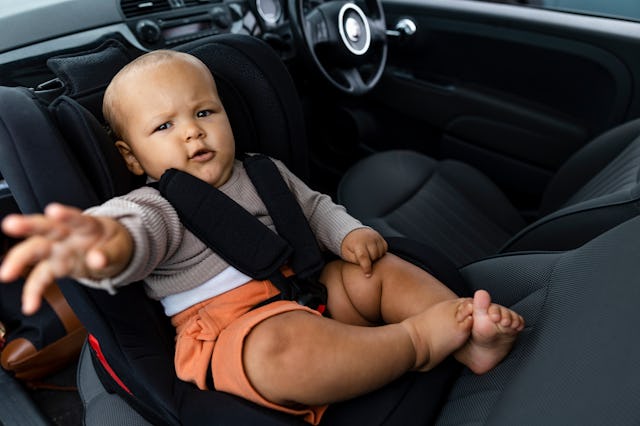Research Shows That Forgetting A Kid In A Hot Car Can Happen To Pretty Much Anyone
And it's not just a summertime problem.

You always think that you’d never be that parent who forgets their child somewhere — especially a place like a hot car — but new research suggests that (surprise!) we’re all human and yes, this horrible occurrence can happen to pretty much anyone.
According to NoHeatStroke.org, since 1998, about 950 children have tragically died in hot cars and more than half of them were left behind unknowingly by their caregiver.
David Diamond, PhD, a professor of psychology at the University of South Florida in Tampa, says that forgetting a child is not a negligence problem but a memory problem.
“The most common response is that only bad or negligent parents forget kids in cars,” Diamond told Consumer Reports (CR). “It’s a matter of circumstances. It can happen to everyone.”
Experts suggest that the stressors of everyday life on parents are a huge contributing factor to the mental gap that some suffer, leading to a child accidentally being left in a car. This is especially true during the summer months when routines are an afterthought, schedules change, and supportive childcare can be nonexistent.
Research shows that it is not just parents who are forgetting their kids in cars. In fact, the list outside of parental figures is quite lengthy.
KidsAndCars.org’s heatstroke fact sheet highlights that caregivers involved in these incidents come from all different aspects of life, including teachers, dentists, social workers, law enforcement officers, nurses, clergymen, military officers, and, yes, even a rocket scientist. All this to say that it can happen to anyone, regardless of education or socioeconomic status.
Even on days with mild temperatures, the heat inside a closed vehicle can reach dangerous levels within an hour, posing major health risks to small children or pets left inside.
CR’s testing found that even when it was 61° F outside, the temperature inside a closed car reached more than 105° F in just one hour, an extremely dangerous and potentially fatal level for a child.
Diamond explained to CR that the issue of caregivers leavings kids in the car has less to do with intentional neglect and more to do with a person’s working memory, including two parts: prospective and semantic.
Prospective memory helps keep track of future endeavors, while semantic memory is that part of the brain that goes on “autopilot” like when you’re driving home and don’t even realize how you got there until you’re in the driveway.
Prospective and semantic memories work together to help us make changes to our routines; these changes could include things such as “drop off the baby at day care” or “stop for groceries on the way home.”
When working memory fails, such as when parents gets distracted by a phone call or the stress of bring late, there can be truly catastrophic effects.
Diamond gave example situations to CR where critical safety steps can be overlooked, such as a surgeon leaving tools in a patient, a pilot not setting the wing flaps for landing, and caregivers forgetting that there’s a baby in the car.
“The habit brain system is a great convenience that allows us to go into autopilot,” Diamond said.
“The beauty of it is that we don’t have to remember every turn, but the problem is that it’s actually guiding our behavior. When it guides our behavior, it suppresses the other part of the brain that is supposed to remind us of additional information.”
Diamond says that parents need to accept the human side of their parenting abilities, noting that something this horrific can happen to anyone. Even the most organized, focused parents can make a small mistake that leads to devastation.
Stress, sleep deprivation, and change in routine all were major contributing factors to instances of children being left in hot cars. Sleep deprivation and stress can also increase the potential for a working-memory failure.
Many times, when a child died from being left inside a hot car, the day’s routine was different than normal.
For example, on a day when someone slept in and pushed back an agenda, or a parent who wouldn’t normally be responsible for day-care drop-off might have been given that task that day, their brains may go into prospective memory.
Because our brains recognize a pattern for the day, this parent would drive to work as usual, even though the baby was along for the ride. And unless there was an external cue, such as seeing the diaper bag or hearing the baby, the parent’s brain would continue on autopilot and could even create a false memory that the child is safely at day care, Diamond found.
So, how do parents and caregivers work to prevent a hot car tragedy?
Diamond told CR that first, parents must be willing to accept that there is a chance this could happen to them. Human memory is faulty and that these memory failures can happen to anyone.
To overcome a memory failure, Diamond suggests using strategies aimed at overcoming memory lapses like doing something totally weird to trigger the reminder that your child is in the backseat.
Here are some helpful safety recommendations for parents and caregivers, tips for how to handle heatstroke in dogs — and what to do if you see a kid left alone in a car.
In 2021, new federal regulations required all new cars to be equipped with an alert system aimed at preventing hot car deaths. It's not yet known when the rear-seat reminder mandate will go into effect. However, the law gives the Department of Transportation two years to implement the new rule, so we should expect something soon!
Read the full report here.
This article was originally published on